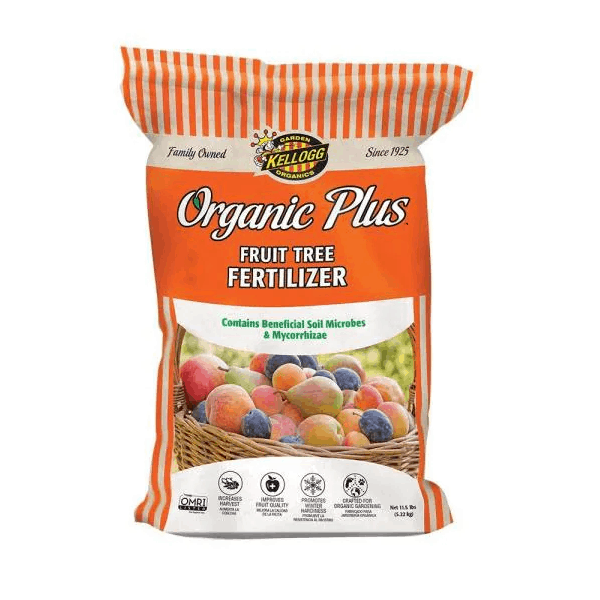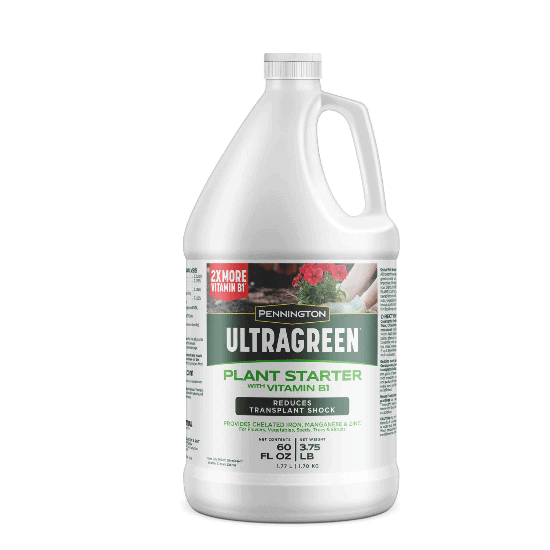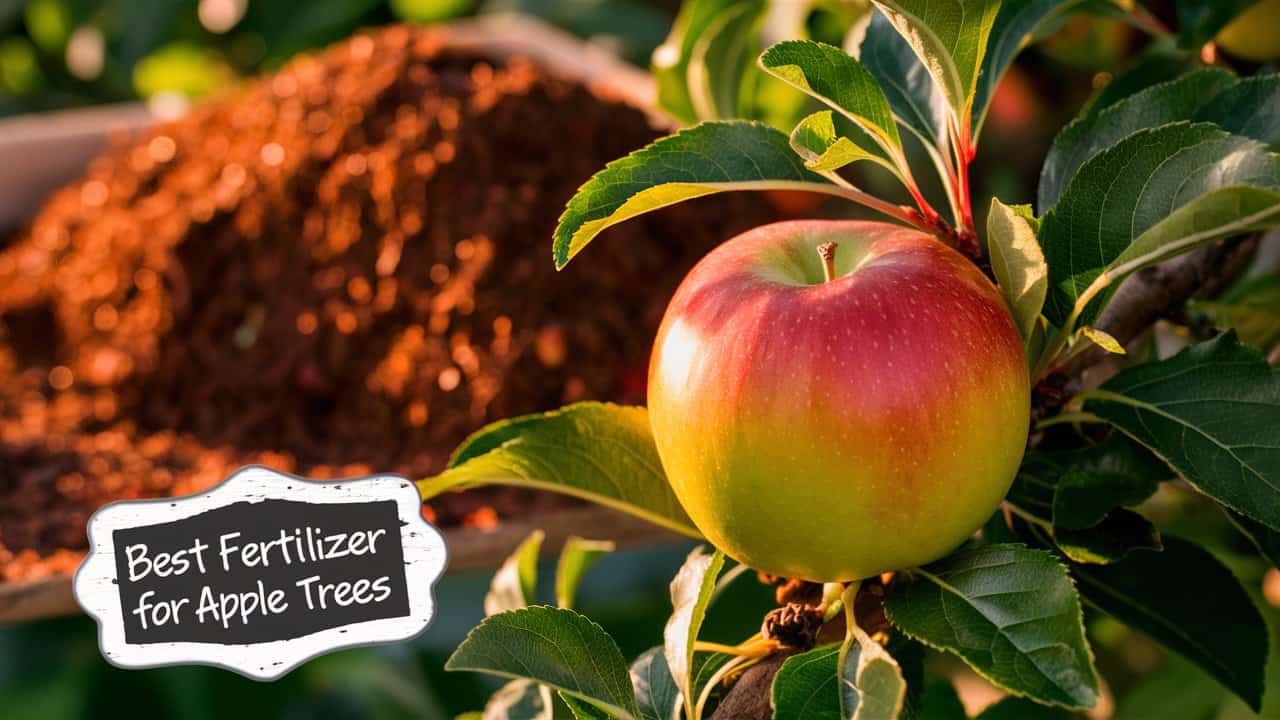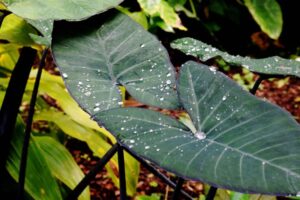Apple trees are a popular fruit tree that makes a great addition to a home orchard. However, they require nitrogen, phosphorus, and potassium in order to produce an abundant harvest. The best fertilizer for apple trees is one that includes all three of these essential nutrients in the proper proportions along with trace elements like iron, magnesium, calcium, and sulfur.
There are many different fertilizers out there; some are better than others. On this page, you’ll find a full selection of the best fertilizers for apple trees currently on the market.
Best Fertilizer for Apple Trees
| Image | Name | Rating | Shop |
|---|---|---|---|
 | Down to Earth Organic Fruit Tree Fertilizer Mix 6-2-4, | ||
 | Winchester Gardens Fruit Tree Fertilizer Spikes | ||
 | Kellog Organic Fruit Tree Fertilizer | ||
 | Pennington UltraGreen Liquid Plant Food |
Best Fertilizer for Apple Trees
Down to Earth Organic Fruit Tree Fertilizer Mix 6-2-4, 50 lb
Down To Earth Organic Fruit Tree Fertilizer (Buy Online) is an all-natural fertilizer made from organic ingredients like kelp meal and fishbone meal, and it’s safe and healthy for both humans and plants alike.
This fertilizer has everything your fruit tree needs to thrive without any harmful chemicals or additives that can damage its roots or leaves. The result is a healthier plant that bears more fruit than ever before
Down to Earth Organic Fruit Tree Fertilizer is an all-natural, organic fertilizer with a 6-2-4 NPK ratio. It contains all of the nutrients a apple tree needs, and it has added calcium which aids in fruit development.
Plus, this fertilizer is made from OMRI certified organic ingredients like feather meal, fishbone meal, calcium carbonate, langbeinite, potassium sulfate, alfalfa meal, and kelp meal.
Espoma Tree-Tone Plant Food, Natural & Organic Fertilizer for Shade, Fruit & Ornamental Trees
Espoma Tree-Tone Plant Food (Buy Online) is a natural fertilizer that helps nurture the development of all types of trees, including apples. It can also be used on fruit and ornamental trees, as well as shrubs and ground cover plants.
This organic plant food has been made with 100% natural ingredients, which provide a long-lasting source of nutrients that will help keep your tree happy throughout the growing season.
Espoma Tree-tone also contains Bio-tone Microbes that slowly break down nutrients in the soil, so you won’t have to worry about over or underfeeding your plants while they’re still young.
Fertilome Fruit, Citrus and Pecan Tree Food 19-10-5 (20 lb.) Fertilizer
Fertilome Fruit Tree Food (Buy Online) provides everything your tree needs throughout the year in one simple product! This timed-release granule formula contains all three primary nutrients (nitrogen, phosphorous, and potassium) plus micronutrients like iron and zinc
The problem with fertilizing trees is that you have to get the timing right. If you fertilize too early, it will burn your tree’s roots and hurt its growth. But if you wait too long, your tree won’t grow as much or produce as many fruits.
Fertilome Fruit Tree Food solves this problem by providing a timed-release formula so that your trees always get the nutrients they require when they need them most.
Plus, with Fertilome Fruit Tree Food there are no more worries about overfertilization because the special formula has been designed for consistent release of nutrients throughout the whole growing season. That means you’ll never have to worry about underfeeding or overfeeding your fruit trees ever again when you use Fertilome Fruit Tree Food
Jobe’s Organics 9227 Fruit & Nut Granular Fertilizer, 4 lb
Jobe’s Organics Fruit & Nut Granular Fertilizer (Buy Online) contains everything your apple tree needs to stay strong and healthy. This organic granular fertilizer helps increase plant growth by improving soil conditions, disease resistance, and drought tolerance.
Plus, the microorganism (archaea) contained in Biozome breaks down organic material in the soil faster than other probiotic fertilizers on the market.
With its easy pour bag, certified organic status (meaning no synthetic chemicals), and fast release formula; Jobe’s Organics Fruit & Nut Granular Fertilizer is a perfect choice if you need to quickly perk up a languishing apple tree.
Kellog 11.5 lb. Organic Fruit Tree Fertilizer

Kellog Organic Fruit Tree Fertilizer (Buy Online) is the perfect solution for you if you’re looking to get away from harmful chemicals. This organic fruit tree fertilizer is made of 100% natural ingredients, including beneficial microbes that allow roots to absorb more nutrients. While the slow-release granular formula feeds your trees for up to 2 months. It’s also formulated with a 4-5-4 NPK ratio which is perfect for optimal fruit development.
Best Fertilizer Spikes for Apple Trees
Winchester Gardens Landscaper Pack Fruit and Citrus Fertilizer Spikes, 8-18-18, 70 Spikes/Case
Winchester Gardens Fertilizer Spikes (Buy Online) make growing apples easy because there’s no guesswork involved in using them! You just drive one spike into the ground near each tree’s drip line (the outer edge of its canopy) and let natural rainfall dissolve them.
Winchester Gardens Fruit and Citrus Fertilizer Spikes are perfect for any type of fruit tree.
These fertilizer spikes have an 8-18-18 NPK ratio that’s perfect for fruit trees since it has a low nitrogen content while providing a good amount of phosphorus and potassium. This will ensure that your trees get everything they need to stay healthy and produce a bountiful harvest.
Best of all, these fertilizer spikes come in a pack of 70 which means there is enough to cover a small orchard of fruit trees. Or you can store them in a dry location and drive a new one into the ground at the base of your apple tree at the beginning of each growing season.
Best Liquid Fertilizer for Apple Trees
Pennington UltraGreen Liquid Plant Food 60 oz.

One way to ensure that a apple tree will thrive in its new environment is by using Pennington Ultragreen Plant Starter Fertilizer (Buy Online) at transplant time and then every two weeks afterward until springtime when growth begins again.
This liquid fertilizer contains chelated iron, manganese, and zinc, which are essential nutrients for healthy plant growth. To use this product properly, mix as directed on the label and apply at transplant time or anytime thereafter during periods of active growth (i.e., summer).
How To Fertilize Apple Trees
Proper fertilization is crucial for apple trees as it provides the essential nutrients they need to grow strong and produce abundant fruit. To begin, it’s important to conduct a soil test before applying any fertilizer. This test will measure the soil’s pH and nutrient levels, allowing you to customize your fertilization approach. Generally, apple trees thrive in slightly acidic to neutral soil, with a pH between 6.0 and 7.0.
When choosing a fertilizer, it’s essential to look for one with a balanced N-P-K ratio (nitrogen, phosphorus, potassium) suited for your tree’s needs. A common recommendation is a 10-10-10 or 14-10-14 fertilizer, which supports root growth and fruit development. You can apply dry granular fertilizers evenly across the root zone, keeping it at least a foot away from the trunk to avoid burning the roots. After spreading, water the area thoroughly to help the nutrients penetrate the soil.
For those who prefer organic options, compost and well-rotted manure are excellent choices. Both not only enrich the soil with nutrients but also improve soil structure and moisture retention. When applying organic fertilizers, it’s advisable to layer them around the tree during the growing season, gradually feeding the nutrients to the roots. Additionally, liquid fertilizers can be used as foliar sprays during the growing season for an extra nutrient boost. Regular fertilization—typically in early spring and again in late summer—will ensure your apple trees stay healthy and productive.
When To Fertilize An Apple Tree
Timing plays a pivotal role in the effectiveness of fertilizer application for apple trees. The best window to fertilize apple trees is during the early spring, just as the trees begin to break dormancy and show signs of new growth. This timing aligns with the trees’ increased nutrient uptake as they prepare for the growing season ahead. Typically, this occurs in March or April, depending on your geographical location and climate conditions.
Another critical period for fertilization is late summer, around August, when fruit trees are in their fruit-setting phase. Applying fertilizer at this time will help support fruit development and preparation for the following season. However, it is essential to avoid fertilizing too late in the growing season—especially in areas with colder winters—as nitrogen can promote new growth that may not harden off before frost sets in.
In regions with extremely hot summers, a split application may be more effective. This involves applying half the recommended fertilizer amount in early spring and the other half in mid-summer. This approach ensures that the nutrients are available when the trees need them most and helps mitigate the risk of nutrient leaching from heavy rains. Lastly, always pay attention to your tree’s growth patterns and adjust your fertilization schedule accordingly; over-fertilizing can be just as detrimental as under-fertilizing.
Fertilizing Freshly Planted Apple Trees
The initial stages of an apple tree’s growth are critical, and adequate fertilization can significantly enhance the establishment of freshly planted trees. Right after planting, it’s generally advisable to avoid using high-nitrogen fertilizers, as they can encourage excessive foliage growth at the expense of root development. Instead, focus on establishing a strong root system first.
A well-balanced slow-release fertilizer with a lower nitrogen content, such as a 5-10-5 formula, works well initially. You can incorporate this type of fertilizer into the planting hole or apply it around the root zone following planting. This helps to encourage root growth and increases the nutrient availability in the soil without overwhelming the young plants.
In addition to fertilizer, consider applying a layer of mulch around the base of the tree. Not only does mulch help retain moisture, but it also suppresses weeds and contributes organic matter to the soil as it decomposes. If you planted your tree in the spring, after about six weeks, you should observe new growth. It’s at this point that you can conduct another soil test, to ensure that the nutrient levels are adequate for the developing tree.
As the tree matures over the first couple of years, gradually increase the fertilizer application volume based on the tree’s growth and health. This gradual approach will foster sustainable and robust growth, ensuring that your apple trees are set up for success in the years to come. Remember, every tree is unique, so monitoring its specific needs is key to a fruitful harvest.
Frequently Asked Questions About Fertilizing Apple Trees
When it comes to apple tree care, many gardeners have a wealth of questions about the best fertilization practices. This section delves into the most commonly asked questions regarding fertilizing apple trees, offering valuable insights to help you nurture your trees effectively.
1. What type of fertilizer is best for apple trees?
The ideal fertilizer for apple trees usually contains a balanced mix of nutrients, particularly nitrogen (N), phosphorus (P), and potassium (K). A ratio like 10-10-10 or 14-10-14 is often recommended, as it supports healthy overall growth and fruit production. Organic options, such as compost or well-rotted manure, provide a gentle, slow-release source of nutrients that also improve soil health. Always choose fertilizers based on a soil test to tailor the nutrient requirements to your specific soil conditions.
2. How often should I fertilize my apple trees?
The frequency at which you should fertilize apple trees largely depends on their age and nutritional needs. For young trees, fertilizing once in early spring and again in late summer can be effective. Mature trees may require additional applications based on growth observations and soil nutrient levels. Generally, a yearly routine is sufficient, but adjusting based on soil tests will yield the best results.
3. Can I use chemical fertilizers on organic apple trees?
While chemical fertilizers can boost production, they may not align with organic gardening practices. For organic apple trees, it’s advisable to stick with certified organic fertilizers. These can include fish emulsion, bone meal, or organic compost. These options promote healthy growth without synthetic additives, keeping your gardening practices aligned with organic standards.
4. Is too much fertilizer harmful to apple trees?
Yes, over-fertilization can be detrimental to apple trees. Excess nutrients can lead to rapid vegetative growth at the expense of fruit production, weakened roots, and increased susceptibility to pests and diseases. In severe cases, it can cause fertilizer burn, ultimately harming the tree’s health. Careful adherence to recommended application rates based on soil tests can prevent over-fertilization.
5. What should I do if my apple tree has yellow leaves?
Yellow leaves on an apple tree can signal nutrient deficiencies, particularly nitrogen. However, yellowing can also result from overwatering, poor drainage, or other environmental stressors. If fertilization is suspected, consider performing a soil test to identify specific nutrient deficiencies. Adjust your fertilization plan accordingly—applying a balanced fertilizer or an organic option can help restore health if nitrogen is lacking.
6. Should I fertilize apple trees in the fall?
Fertilizing in the fall is generally not recommended as this can stimulate new growth that may not survive the winter. Instead, focus on fertilizing in early spring and late summer for optimal results. However, applying a slow-release organic fertilizer during late summer can help prepare the tree for the following growing season without promoting excessive growth before dormancy.
7. Can I apply fertilizer after I prune my apple tree?
Yes, you can fertilize after pruning your apple tree. In fact, applying fertilizer post-pruning can help support the tree’s recovery and encourage healthy new growth. However, ensure you wait a few weeks post-pruning to allow the tree to adjust to the changes. This approach allows the tree to effectively utilize the nutrients as it starts to regenerate.
8. What are signs that my apple tree needs fertilizing?
Look for several signs that indicate your apple tree may need fertilization. Sparse blooming or poor fruit production, stunted growth, and pale, yellowing leaves can all indicate nutrient deficiencies. Additionally, if you notice your tree is not producing as much fruit as in previous years or if its growth appears sluggish, it’s a good idea to consider fertilization.








